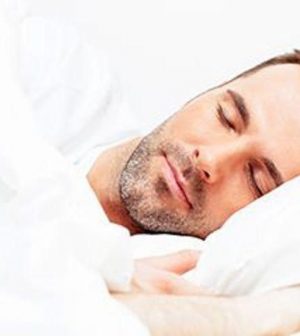- Could Artificial Sweeteners Be Aging the Brain Faster?
- Techniques for Soothing Your Nervous System
- Does the Water in Your House Smell Funny? Here’s Why
- Can a Daily Dose of Apple Cider Vinegar Actually Aid Weight Loss?
- 6 Health Beverages That Can Actually Spike Your Blood Sugar
- Treatment Options for Social Anxiety Disorder
- Understanding the Connection Between Anxiety and Depression
- How Daily Prunes Can Influence Cholesterol and Inflammation
- When to Take B12 for Better Absorption and Energy
- Epsom Salts: Health Benefits and Uses
Need a Pill to Help You Sleep? You’re Far From Alone, Survey Finds

If you struggle to fall asleep at night, you are not alone.
About 28% of Americans say insomnia is taking a toll on their daily lives, and about 64% say they take sleep aids to help them fall asleep or stay asleep.
“Chronic insomnia is a dangerous public health problem,” said Jennifer Martin, a licensed clinical psychologist and president of the American Academy of Sleep Medicine (AASM).
“When left untreated, chronic insomnia can lead to a range of long-term health issues, including depression, Alzheimer’s disease, type 2 diabetes and more, and can impact nearly every aspect of your life,” Martin said an AASM news release.
To mark the “shortest night of the year,” June 21, AASM took the covers off a new survey about insomnia. It included 2,010 adults across the United States.
Of the nearly two in three taking sleep aids, 23% use prescription medications, 27% use melatonin and 20% use marijuana or CBD (cannabidiol). About 37% said their use of sleep aids had increased during the COVID-19 pandemic.
The AASM suggested that people who suspect they have chronic insomnia should work with their health care provider to find the best treatment choice.
Though noting that melatonin can help, AASM said the supplement should not be used to treat adults with chronic insomnia. Melatonin and sleep aids are not a “one-size-fits-all” remedy, the group added. There are many reasons people have trouble sleeping.
“Developing healthy sleep hygiene habits can help someone who has a mild or short-term case of insomnia, but if symptoms persist into the daytime and inhibit your quality of life, it’s time to seek support from your doctor,” said Michael Grandner, a licensed clinical psychologist and president of the Society for Behavioral Sleep Medicine.
Sleep specialists can make an accurate diagnosis for ongoing sleep problems and develop a proper treatment plan for each patient, Grandner said.
The recommended first-line treatment for chronic insomnia is cognitive behavioral therapy (CBT).
CBT combines behavioral strategies, such as setting a consistent sleep schedule and getting out of bed when you are struggling to sleep, and cognitive strategies, such as replacing fears about sleeplessness with more helpful expectations. Recommendations developed through CBT are tailored to each patient’s individual needs and symptoms.
Martin explained that “cognitive behavioral therapy can help patients by providing customized strategies for individuals of all ages who are suffering from insomnia,” and it can produce meaningful improvements and is cost-effective.
More information
The U.S. National Library of Medicine has more information on insomnia.
SOURCE: American Academy of Sleep Medicine, news release, June 20, 2022
Source: HealthDay
Copyright © 2026 HealthDay. All rights reserved.










